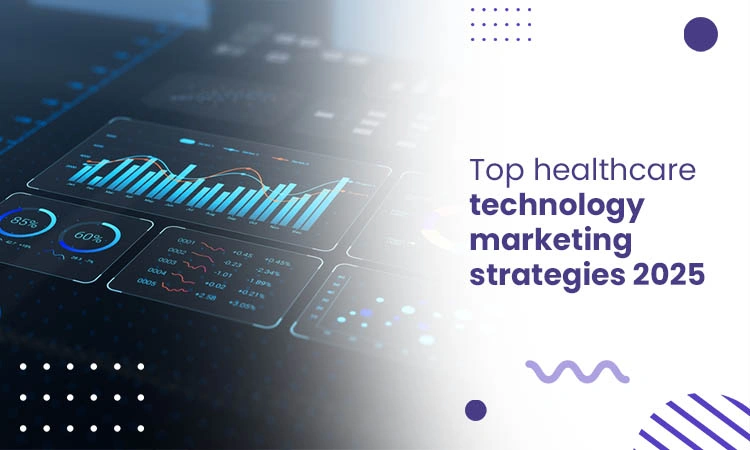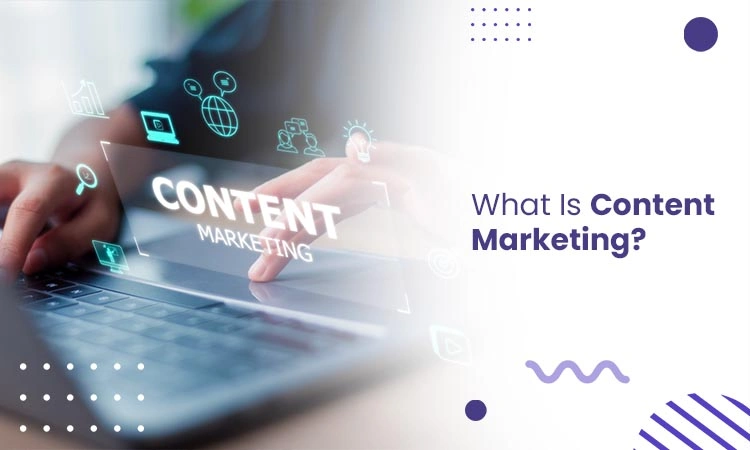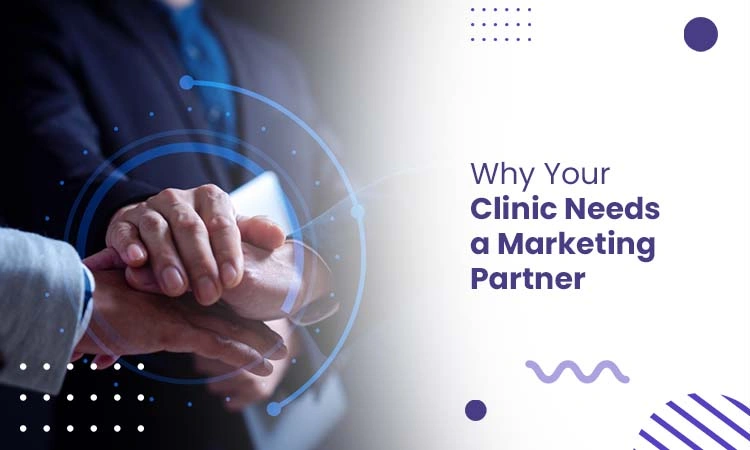The demand for addiction treatment has never been more urgent. With rising substance use disorders across communities, treatment centers are not just saving lives they're reshaping them. But the harsh truth? If no one knows about your facility, you're not reaching those who need you most. That’s where a well-crafted addiction treatment center marketing plan makes all the difference.
Why Marketing Matters for Treatment Centers
You could have the best clinical team, the most peaceful location, and top-tier success rates but if you’re not showing up in searches or being referred by professionals, your beds stay empty. A powerful marketing strategy doesn’t just attract attention. It builds trust, encourages inquiries, and fills your pipeline with qualified leads.
Let’s break down how to grow your addiction treatment center using practical marketing strategies tailored for the healthcare space.
Building a Solid Foundation
Define Your Mission & Vision Clearly
Your mission and vision aren’t just nice words for your website they guide every outreach and interaction. Whether you’re focused on inpatient recovery or outpatient support, clarity in your purpose helps you attract the right audience and build stronger campaigns.
Know Your Ideal Patient Persona
Get specific. Are you targeting young adults with opioid addiction? Professionals dealing with alcohol dependency? Veterans? Knowing who you’re talking to sharpens your message and improves your results.
Create a Brand That Resonates
Name, Logo & Color Psychology
Create an identity that evokes hope and trust. Avoid anything clinical or cold. Your brand should emotionally connect with those in crisis and their families.
Consistent Messaging Across Channels
Use human-first language. Avoid overly technical terms. Every ad, blog post, or video should feel like it's speaking directly to the reader.
Website Optimization
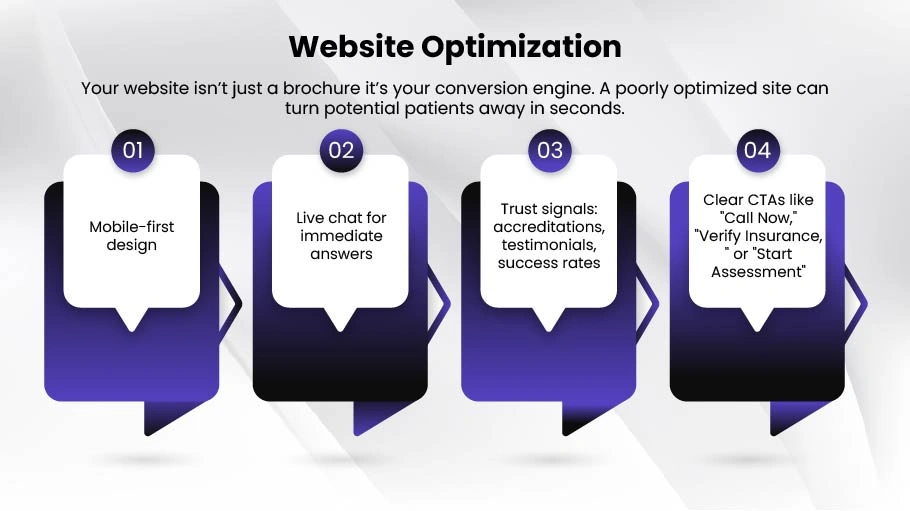
Your website isn’t just a brochure it’s your conversion engine. A poorly optimized site can turn potential patients away in seconds.
- Mobile-first design
- Live chat for immediate answers
- Trust signals: accreditations, testimonials, success rates
- Clear CTAs like "Call Now," "Verify Insurance," or "Start Assessment"
Healthcare Digital Marketing Strategies That Work
1. SEO (Search Engine Optimization)
There is no negotiating a high Google ranking. Keywords like addiction treatment center marketing strategy should be organically and deliberately incorporated into your content. Pay attention to:
- Location-based SEO ("addiction recovery in Los Angeles")
- High-value blogs answering common questions
- Optimized metadata
2. Paid Ads (Google Ads, Meta Ads)
Target families searching for urgent help. Run campaigns around insurance acceptance, specialized programs, or testimonials.
3. Content Marketing
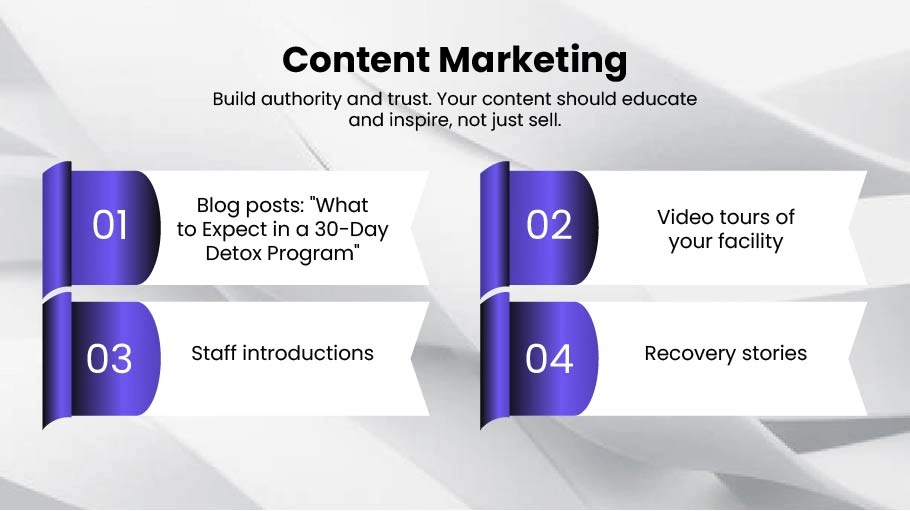
Build authority and trust. Your content should educate and inspire, not just sell.
- Blog posts: "What to Expect in a 30-Day Detox Program"
- Video tours of your facility
- Staff introductions
- Recovery stories
4. Social Media Marketing
Be present where your audience hangs out. Instagram reels, Facebook lives, and TikTok success stories are great options to challenge stigma and create connection.
5. Email & SMS Marketing
Don’t ignore the power of follow-up. Use email nurturing to stay top-of-mind for families still deciding.
Leverage Local Community Outreach
Referral Partnerships
Build relationships with:
- Hospitals
- ERs
- Primary care doctors
- Mental health counselors
- Probation officers
Community Events & Education
Host awareness seminars, sponsor recovery walks, and attend local health fairs.
Reputation Management
People read reviews. Period. Ask satisfied clients and families to leave honest feedback on Google, Yelp and Facebook. Respond to negative reviews professionally and empathetically.
Using CRM & Analytics to Drive Growth
Track What Works (and What Doesn’t)
- Google Analytics for web traffic
- Call tracking tools
- CRM for lead management and conversion rates
Invest in HIPAA-Compliant CRM Tools
Automate follow-ups, segment leads, and personalize outreach all while staying compliant.
Hiring the Right Marketing Talent
Your marketing staff, whether internal or external, should be knowledgeable in the emotional nuances of addiction rehabilitation as well as healthcare digital marketing. Seek out:
- Experience with rehab or behavioral health brands
- Knowledge of HIPAA-compliant tools
- Strong portfolio in patient acquisition campaigns
Budget Allocation & ROI Measurement
Know where your dollars go:
- 40% Digital advertising
- 25% SEO & content
- 20% Outreach & partnerships
- 15% Tools & analytics
Track lead cost, conversion rate, and patient lifetime value. Regularly reassess what’s driving results.
Scaling Up Without Losing Connection
As you grow:
- Maintain quality care
- Scale systems (use automation for intake, follow-ups)
- Expand digital reach while preserving human tone
Your patients should feel cared for from first click to final discharge.
FAQs
Google Ads and SEO tend to be the most effective, especially when targeting urgent searches like 'rehab near me' or 'detox center in [city].'
Absolutely. It’s a great way to share success stories, engage with families, and build a community that normalizes seeking help.
Build a professional, mobile-optimized website and start local SEO. These are your foundation for visibility.
SEO may take 3-6 months. Paid ads can deliver leads within days. Long-term success comes from consistency and optimization.
It depends on your resources. A healthcare digital marketing agency brings expertise and tools that are often more cost-effective than building an internal team.
Conclusion: Make It About People, Not Just Numbers
A successful marketing strategy for addiction treatment centers isn't just about clicks or calls. It's about connection. The people calling often feel frightened, spent, exhausted, and desperate. Show them they are in the right place.
When marketing is done right grounded in purpose, backed by strategy you’re not just growing your facility. You’re expanding hope.

